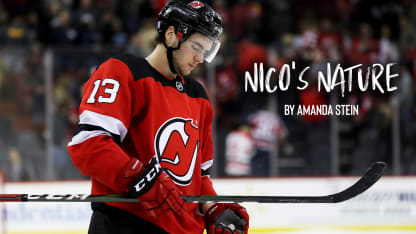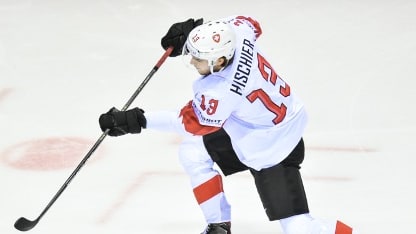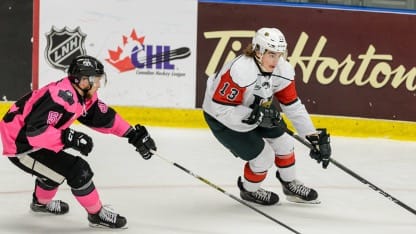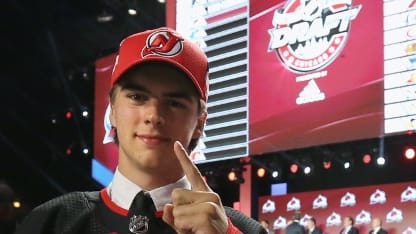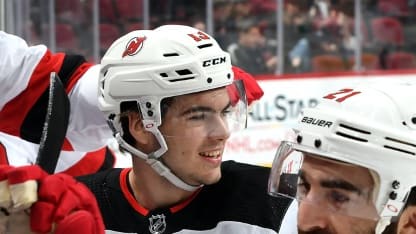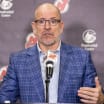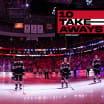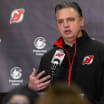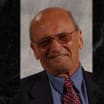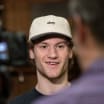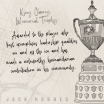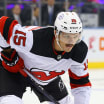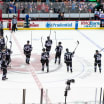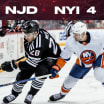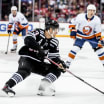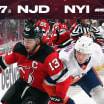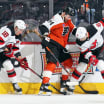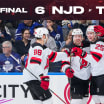"I like the mountains, even for me when I'm gone for like eight, nine months and coming back [to Switzerland] I'm impressed," Hischier said last month. "I lived there 17 years, during those years you don't really think about it, appreciate it, so it was literally the first time when I came back at 18 years old, that was the first time I was like 'woah,' from my hometown window I was like 'What's this mountain? Was it that big all the time?" you start to see those things when you're gone for a while."
Hischier appreciates the little things. It seems a part of his very humble nature growing up in Naters. Anyone who has known Nico for years, or even by way of small encounters all recall the same thing. How humble he is. Unwilling, it seems at times, to acknowledge the amount of success he's accomplished in his young life.
At around age 12, Hischier focused his energy on hockey. In his U-15 year, he had 97 points in 20 games. 'The boy from Valais' played 22 games with the U-17 Visp team that same year. He had 77 points.
Sebastien Pico was the general manager of HC Visp, Hischier was playing for the junior Visp club.
Pico began to put Hischier on journalists' radar.
Emmanuel Favre, who is a Swiss journalist covering the NHL based out of Montreal recounted this story:
"At home, we have two stars," Pico said. "One that the world knows: Alex Kovalev. There is also one other, one that the world will soon know: Nico Hischier."
Favre said he though Pico may have been pulling his leg, finding a way to shed a spotlight on his junior club.
Alex Kovalev had just left the NHL after a career of 1316 games and 1029 points. The hockey world certainly knew Kovalev and his exquisite talents.
So, who could this Hischier boy be?
"I was perplexed," Favre recalled. "I thought that Pico just wanted to put the spotlight on his club. The following week, I attended a match Nico was playing, there were just 25 fans in the stands."
With the experience of covering hockey for 20 years, Favre sat down to watch and just minutes into the game he couldn't believe what he was seeing.
"I had to see just two shifts," Favre told me. "Two shifts, to realize that this kid from Naters actually had a hockey-sense that I had never seen in any other Swiss forward."
Youth hockey doesn't quite have the same following that you'd find here in North America, that you would in Switzerland. Mostly, you'll find the spectators are parents and family members of the players on the ice.
"We never talk about it on television, we do not find the results in the newspapers," Favre said.
So maybe it took a little longer for the Hischier name to catch on in Switzerland, but when it did, it took hold.
"Nico has played very few matches in professional leagues in Switzerland, just 28," Favre said, "But, on one occasion, in one of those games, Hischier did something absolutely crazy. During a Swiss Cup match, he played with Bern against Visp, at the Visp ice rink. He was just 16 years old... The match was played to the shootout. And it was he, in the rink of his childhood, who had scored the winning goal for Bern. It takes a hell of a lot to do that. On that stage."
He became a recurring topic," Bürgler said. "At first it was mostly regional coverage in his native Canton of Valais. But the national media covered him too. Even more so during his year in the Quebec league, and he was one of the top prospects for the draft. In the last few days before the draft, things got crazy. There was a new story about Nico every day."
And then came the World Juniors.
If you hadn't heard of him before then in Switzerland, he was now on your radar.
"I think the first time he really made the news with the national team in Switzerland was in 2015, with the under-18 team," Bürgler said. "The world championships were in Zug, Switzerland and the Swiss team surprisingly made it to the bronze medal game. He was only 16 then, and his impact was not necessarily that big. But in 2017 he was by far the best Swiss player at the world junior championships in Montreal and Toronto. He carried the Swiss team on his back and to the quarterfinals where he scored twice and single-handedly almost beat the U.S. team."
That too, but Hischier on Ray Shero's radar.
"Nico can certainly score, but he also has great playmaking abilities, and the ability to make other players better," Shero said. "He was so impressive at the World Juniors, and U-18s, but especially with what he was able to do at Halifax in helping them make the playoffs as a young team and really driving that team and how he was able to make a difference."
After Hischier's first year in the NHL, there was much anticipation back in Switzerland that he would be able to play for the men's national team for the first time. Buergler noted that many didn't get to see Nico play with the Devils because of the time difference, this would be their chance. Unfortunately, a wrist injury prevented him from participating.
"But that made this spring even more exciting," Bürgler said. "When Nico could finally made his debut with the men's national team. And he scored a hattrick in his first game. He had a very big impact right away. Especially, since the center position used to be one of the weaknesses of the swiss team. Having Nico definitely changes that."
"And when it mattered, he would score," he added. "That's also a quality, Swiss players often lacked."

